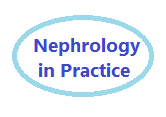
ADPKD is an inherited multisystem disorder, characterized by progressive cystic enlargement of the kidneys (a comprehensive review can be read here). Nephrologists in Egypt have limited options to treat ADPKD patients with the absence of Tolvaptan from the Egyptian market. Alternative therapeutic options include Octreotide (Sandostatin), SGLT2i, Domperidone and Metformin.
We previously discussed how Octreotide showed perplexing results in the ALADIN and DIPAK-1 trials. We also discussed recently potential benefits and harms of SGLT2i in ADPKD. Metformin may reduce cyst growth by inhibiting cyclic AMP generation in cells and via downstream effects of AMP-activated protein kinase (AMPK) activation in inhibiting the cystic fibrosis transmembrane conductance regulator (CFTR) and Mammalian Target of Rapamycin (mTOR) pathways. Only a single-arm pilot study of metformin in patients with autosomal dominant polycystic kidney disease has been reported and found Metformin to be safe even in advanced CKD. RCTs testing Metformin in ADPKD patients are currently ongoing like the TAME-PKD (NCT02656017) and other trial. Finally, Domperidone, a dopamine receptor agonist has been hypothesized to be one of the therapeutic options to treat ADPKD. Again, no trials are out yet!
Ketogenic diet in ADPKD:
Recently, there has been an increasing interest in Ketogenic diet for many diseases including cystic diseases like, polycystic ovary and polycystic kidney.
How does Ketogenic diet inhibit cyst growth?
Ketogenic diet induce a state of ketosis. In a recent Cell Metabolism paper, Weimbs and colleagues showed that in rat models, the metabolic state of ketosis is important for inhibiting PKD progression. They also show that simply adding the natural ketone β-hydroxybutyrate to a normal diet replicates the beneficial effects of a Ketogenic regimen.
Explanations include:
1. PKD cells have been shown to have an altered cellular metabolism in which the preferred fuel source is glucose that is primarily metabolized by glycolysis, resembling a Warburg-like effect. This could lead to overall metabolic inflexibility that may lock PKD cells in a dependency on glucose and glycolysis.
2. ketosis involves the increased supply of fatty acids released by the adipose tissue. During acute fasting, which leads to a rapid onset of ketosis, the ability of PKD cells to sequester fatty acids in lipid droplets may be overwhelmed leading to lipotoxicity and cell death

Ketogenic diet works for other diseases?
Ketogenic diet worked also for polycystic ovary disease. In a small pilot study, keto diet led to significant improvement in weight, percent free testosterone, LH/FSH ratio, and fasting insulin. And in another study, it led to a significant decrease of triglycerides, total cholesterol and LDL along with a rise in HDL levels. The LH/FSH ratio, LH total and free testosterone, and DHEAS blood levels were also significantly reduced. Estradiol, progesterone and SHBG increased.
We previously reported the safety of Ketogenic diet in an obese CKD patient, who had hypertension, mild proteinuria and CKD 3a. He underwent partial nephrectomy for unilateral renal cell carcinoma. He had a body weight of 103 kg and a BMI of 33. He started keto diet, and managed to lose 13 kg of his weight over 4 month period (BMI went down from 33 to28) with stable serum creatinine and eGFR, which even got better after losing weight.

Are there any trials testing Ketogenic diet in ADPKD?
GREASE II is an ongoing phase II randomized, 12-month, parallel-group, superiority study to evaluate the efficacy of a Modified Atkins Diet in ADPKD patients. This is the first RCT to test the effect of keto diet on ADPKD progression. The trial adopts a significant primary outcome (total kidney volume)
Another newer clinical study at the University of Cologne and Cologne University Hospital is investigating whether a Ketogenic diet has a positive effect on patients with polycystic kidney disease. The trial is funded by the American PKD Foundation (NCT04680780).
Till the results of these trials come out, I I’ll encourage ADPKD patients to do intermittent fasting, which also has shown to slow PKD progression in rat models. An ongoing clinical trial in the University of Colorado, Denver is currently comparing Daily Caloric Restriction and Intermittent Fasting in Overweight and Obese Adults With ADPKD (NCT03342742).

One thought on “Ketogenic Diet in ADPKD patients”
Comments are closed.